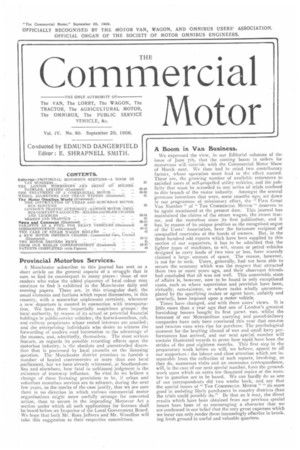Provincial Motorbus Services.
Page 1

If you've noticed an error in this article please click here to report it so we can fix it.
A Manchester subscriber to this journal has sent us a short article on the general aspects of a struggle that is sure to find its counterpart in many places : those of our readers who value the added piquancy of local colour may continue to find it exhibited in the Manchester daily and evening papers. There are, in this triangular duel, the usual elements and factions which repeat themselves, in this country, with a somewhat unpleasant certainty, whenever a new departure is mooted in connection with transportation. We have three impartially suspicious groups : the local authority, by reason of its actual or potential financial holdings in public-service vehicles; the horsed-omnibus, cab, and railway proprietors whose vested interests are assailed ; and the enterprising individuals who desire to witness the forwarding of modern road locomotion to the advantage of the masses, and, admittedly, themselves. The most serious feature, as regards its possible retarding effects upon the motorbus industry, is the absolute and uncontrolled discretion that is possessed by local councils on the licensing question. The. Manchester district promises to furnish a number of heated controversies at more than one local parliament, but we have already witnessed, at Southend-onSea and elsewhere, how fatal to unbiassed judgment is the existence of tramway influence. So vital do we believe a change of these licensing provisions to be, if urban and suburban motorbus services are to advance, during the next few years, as the merits of the case justify, that we are sure there is no direction in which various commercial motor organisations might more usefully arrange for concerted action, than to secure in the impending Motorcar Act a section under which all such applications for licenses shall be heard before an Inspector of the Local Government Board. We hope that both Mr. Rees Jeffreys and Mr. Woodfine will take this suggestion to their respective committees.
A Boom in Van Business.
We expressed the view, in our Editorial columns of the issue of June 7th, that the coming boom in orders for motorvans will coincide with the Commercial Motor Show of March next. We then had in mind two contributory factors, whose operation must lead to the effect named. These are, the growing number of available references to satisfied users of self-propelled utility vehicles, and the publicity that must be accorded to any series of trials confined to this branch of the motor industry. Amongst the several germane intentions that were, some months ago, set down in our programme of missionary effort, the "First Great Van Number" of "THE COMMERCIAL MOTOR deserves to be again mentioned at the present date. This journal has maintained the claims of the steam wagon, the steam tractor, and the motorbus since its first publication, and it has, by reason of its unique position as the recognised organ of the Users' Association, been the fortunate recipient of unequalled courtesies at the hands of owners. But, in the three hundred odd reports which have been supplied by this section of our supporters, it has to be admitted that the lighter types of machines, to wit, steam or petrol vehicles designed tO carry loads of two tons or less, have scarcely claimed a large amount of space. The reason, however, is not far to seek. Users, generally, had not been able to secure the economy which was the magnet that attracted them two or more years ago, and their observant friends had concluded that all was not well. This unenviable state of affairs is, however, now to be found in only exceptional cases, such as where supervision and prevision have been, virtually, non-existent, or where tasks wholly uncontemplated by the specifying maker or agent have, unfairly and unwisely, been imposed upon a motor vehicle. Times have changed, and with them users' views. It is little more than a year ago that one of London's greatest furnishing houses bought its first 3ocwt. van, whilst the foremost of our Metropolitan carrying and parcel-delivery companies have only been convinced this year that one-ton and two-ton vans were ripe for purchase. The psychological moment for the bruiting abroad of van and small lorry performances has arrived, and our next special number will contain illustrated records to prove how rapid have been the strides of the past eighteen months. This first step in the preparatory work before us will, we believe, appeal to all our supporters : the labour and close attention which are inseparable from the collection of such reports, involving, as they do, numerous visits and an enormous correspondence, will, in the case of our next special number, form the groundwork upon which an extra ten thousand copies of the number in question are to be based. We can hardly do as one of our correspondents did two weeks back, and say that the special issues of "THE. COMMERCIAL MOTOR "do more good in assisting likely purchasers in country districts than the trials could possibly do." Be that as it may, the direct results which have been obtained from our previous special issues have been of so encouraging a character that we are confirmed in our belief that the very great expenses which we incur can only render them increasingly effective in break_ ing fresh ground in useful and valuable quarters.
25 82
























